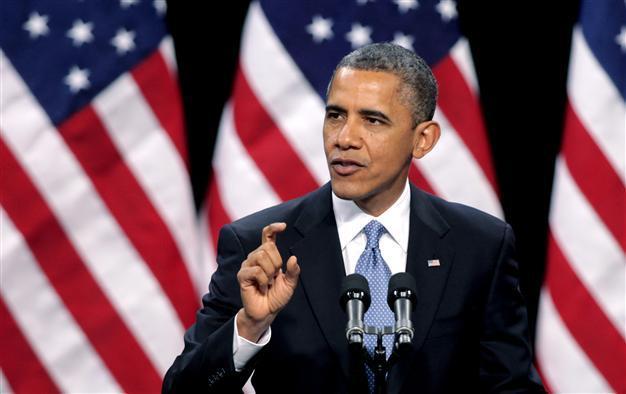Obama to hand secret drone war guidelines to lawmakers
WASHINGTON - Agence France-Presse

President Barack Obama. AFP Photo
In a reversal, President Barack Obama will allow lawmakers access to secret documents outlining the legal justification for drone strikes that kill US citizens abroad who conspire with Al-Qaeda.
An administration official disclosed the move Wednesday on the eve of a Senate hearing on Obama's nomination of his top White House anti-terror adviser John Brennan to lead the Central Intelligence Agency in his second term.
Some senators had warned they would use Brennan's confirmation as leverage to force the administration to share more information on the legal and constitutional grounds for the US government killing its own citizens.
The disclosure also comes after NBC News published an unclassified Justice Department white paper covering similar ground, reigniting the debate about the killing of estranged Americans who switched sides in the "War on Terror." "Today, as part of the president's ongoing commitment to consult with Congress on national security matters, the president directed the Department of Justice to provide the congressional intelligence committees access to classified Office of Legal Counsel advice related to the subject of the Department of Justice white paper," the official said.
Obama aides insist killing Al-Qaeda suspects, including occasionally US citizens, in hotspots like Yemen complies with US law and the Constitution, even when no intelligence links the targets to specific attack plots.
"We conduct those strikes because they are necessary to mitigate ongoing actual threats, to stop plots, to prevent future attacks and, again, save American lives," White House spokesman Jay Carney said Tuesday.
"These strikes are legal, they are ethical and they are wise." Among the most controversial of the attacks were the September 2011 killings in Yemen of Anwar al-Awlaki and Samir Khan, which stoked concern because the pair were both US citizens who had never been charged with a crime.
Democratic Senator Ron Wyden has been among the most vocal of lawmakers demanding to know details of how the administration interprets its power to take out US citizens who are waging war against their own nation.
He said lawmakers needed to see the information to ensure that such power was subject to the appropriate safeguards and limitations. "Every American has the right to know when their government believes that it is allowed to kill them," Wyden said Tuesday.
"I will continue to press the administration to provide Congress with any and all legal opinions that outline the president's authority to use lethal force against Americans.
"I will not be satisfied until I have received them." The white paper published by NBC News offers a more expansive definition of when a drone strike against a US citizen can be justified than has been available in the past.
Extracted from the secret documents that will now be made available to congressional committees with jurisdiction over the war on terror, the memo expands on the concept of self-defense used to justify an attack.
It also states that an attack against the United States or its interests by a targeted person does not need to be deemed as "imminent" for a strike to take place.
"The condition that an operational leader present an 'imminent' threat of violent attack against the United States does not require the United States to have clear evidence that a specific attack on US persons and interests will take place in the immediate future," the memo says.
Instead, an "informed, high-level" official could decide that the target posed "an imminent threat of violent attack against the United States" if he had "recently" engaged in such activities, and there was no evidence he had renounced or abandoned them.
The 16-page memo also says the individual's capture must be unfeasible, which includes situations where capture would pose an "undue risk" to US personnel.
Some civil liberties groups were dismayed by the memo, arguing that the president was assuming powers to kill US citizens without presenting evidence to a judge or even letting the courts know about an attack after the fact.
